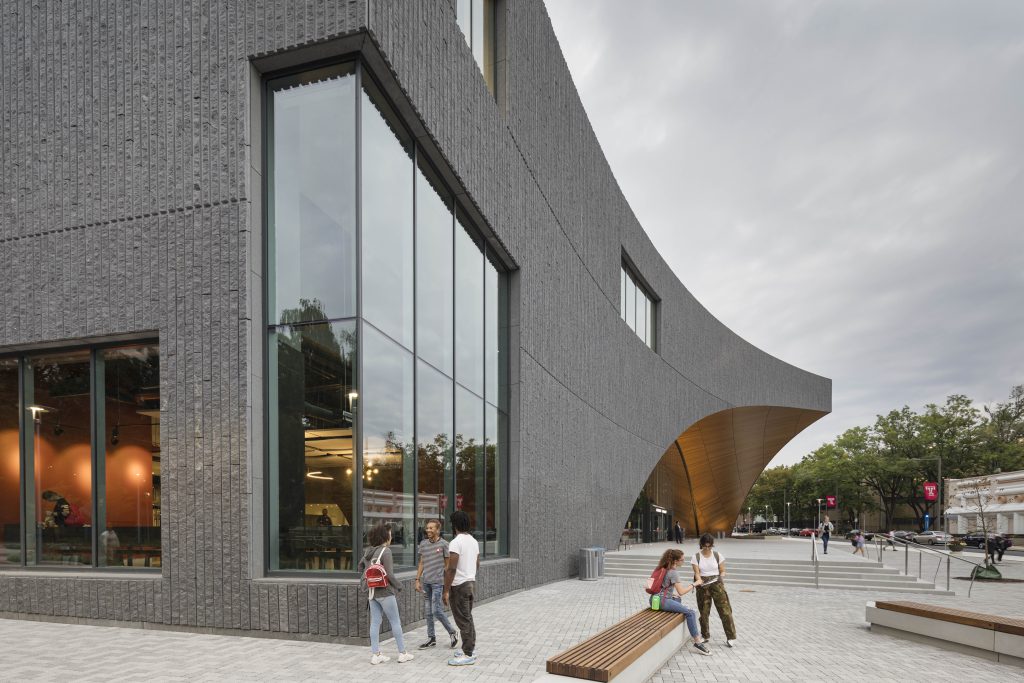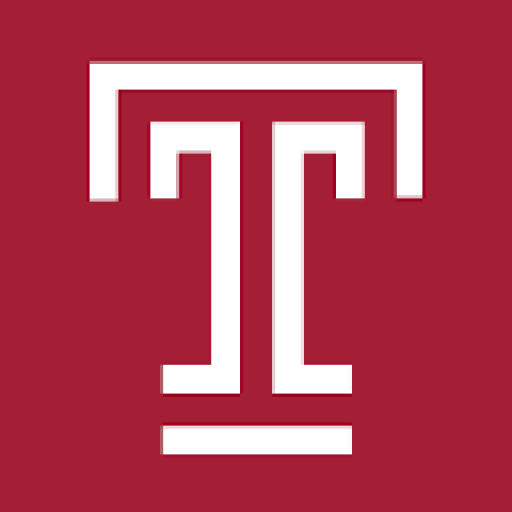Program
As we continue to adjust to technological and societal changes brought on by the pandemic, in what ways do our library facilities need to evolve to meet the current and future needs of students, faculty, community members, and other stakeholders? The Designing Libraries IX program is geared to engage presenters, panelists, and attendees in serious thought and conversation about such matters as using architectural history to plan public facing spaces, designing inclusive libraries, and making the case for a new library vision in times of resource constraints. Attendees will hear from librarians engaged in various phases of the building process, from design to programming to lessons learned from recent completions. As with past Designing Libraries conferences, there will be time for building tours, networking, and informal learning with planners, designers, architects, and librarians engaged in building projects.

Photo of Charles Library by Michael Grimm
Banner photo: Betsy Manning, Temple University
Preconference: Good as New: A Workshop on Redesigning, Repurposing, and Renovating Existing Facilities [Sold out]
Breakfast at 8:00 am, session from 9:00 am – 3:30 pm
Ormandy West Room, DoubleTree by Hilton Philadelphia Center City
Presenters
Elliot Felix; Founder and Partner; brightspot strategy, a Buro Happold Company
Kit Meyer; Senior Project Manager, Capital Construction and Renovation; University of Virginia
Jaspreet Pahwa; Director, Capital Planning and Construction; DC Public Library
DaVonne R. Rooney; Paul J. Gutman Library; Thomas Jefferson University – East Falls
Kornelia Tancheva; The Hillman University Librarian and Director, University Library System; University of Pittsburgh
John Unsworth; Dean of Libraries and University Librarian; University of Virginia
This full-day workshop will provide a detailed look at a number of current re-design and renovation projects at various scales from wholesale building reconfiguration and expansion in a research library context; rethinking library spaces at medium sized universities; and renovating neighborhood and branch libraries in a public library context. After the presentation, Elliot Felix of brightspot will facilitate a hands-on planning exercise for approaching these types of projects.
Preconference Tour: Architectural Treasures at the University of Pennsylvania
12:00 pm – 5:00 pm
Architectural treasures at the University of Pennsylvania, including the Fisher Fine Arts Library, designed by Frank Furness, and the Penn Museum
Preconference Tour: Philadelphia Museum of Art
12:00 pm – 5:00 pm
Philadelphia Museum of Art tour with focus on recent renovations designed by renowned architect Frank Gehry
Evening Reception and Conference Kickoff
5:00 pm – 7:00 pm
Overture Room and Symphony Ballroom, DoubleTree by Hilton Philadelphia Center City
Registration and Breakfast
7:30 am – 8:30 am
Rooms 200BC and 217, Howard Gittis Student Center, Temple University
Welcome: Setting the Stage
8:30 am – 9:00 am
Room 200BC, Howard Gittis Student Center, Temple University
Joe Lucia; Dean of University Libraries; Temple University
Taking the Book to the Light: Making Three Philadelphia Libraries: Keynote
9:00 am – 9:45 am
Room 200BC, Howard Gittis Student Center, Temple University
David Brownlee; Frances Shapiro-Weitzenhoffer Professor of History of Art Emeritus
The idea of the American library was born in Philadelphia in the eighteenth century. Since then, this has been a place of sustained innovation by architects and clients who have created buildings that do more than facilitate access to books. The University of Pennsylvania Library, opened in 1891, was conceived by architect Frank Furness and his brother and library committee chair Horace Howard Furness as an embodiment of the unstoppable spirit of the nation’s largest manufacturing city. The central branch of the Free Library was designed by Julian Abele, the first African American graduate of Penn’s architecture program. Completed in 1927, it was part of the effort by a remarkable group of civic leaders to undo the work of the previous generation and transform the industrial metropolis into a center of culture and commerce. And when the library of Phillips Exeter Academy opened in 1972, Philadelphia’s Louis Kahn (working with long-serving librarian Rodney Armstrong) put on display the new direction for modern architecture that had been born in this city. Eschewing generalizing abstraction and mere functionalism, he made a library that moved books—and their readers—to the light.
Break
9:45 am – 10:00 am
Room 200BC, Howard Gittis Student Center, Temple University
Libraries in the Community
10:00 am – 11:15 am
Room 200BC, Howard Gittis Student Center, Temple University
Moderator
Joe Lucia; Dean of University Libraries; Temple University
Presenters
Steve Charles; Trustee; Temple University
Craig Dykers; Founding Partner, Architect; Snøhetta
This discussion will explore the institutional context and development of the Charles Library project, and the experiential qualities of thoughtfully-designed public and community spaces.
Libraries as Inclusive Spaces
11:15 am – 12:15 pm
Room 200BC, Howard Gittis Student Center, Temple University
Moderator
Nancy Turner; Director for Planning, Strategy and Organizational Evolution, University Libraries; Temple University
Presenters
Adé Cornelius; Architectural Designer; Urban Practice
Emily Daly; Interim Associate University Librarian for Research and Public Services; Duke University
Shannon Dowling; Associate Principal, Learning Environments Strategy and Design; Ayers Saint Gross
How do we design libraries to be welcoming to all? Three panelists will present their research and how it might inform this topic. Our discussion will also suggest best practices for making library spaces inclusive to diverse communities.
Lunch
12:15 pm – 1:30 pm
Library Spaces and Student Success
1:30 pm – 2:30 pm
Room 200BC, Howard Gittis Student Center, Temple University
Moderator
Steven Bell; Associate University Librarian, University Libraries; Temple University
Presenters
Elliot Felix; Founder and Partner; brightspot strategy, a Buro Happold Company
Robyn Huff-Eibl; Head, Access & Information Services, University Libraries; University of Arizona
For many students the academic library is their go-to space for serious study, group meetings, and other day-to-day tasks that contribute to persistence to on-time graduation. In this session panelists will discuss how library design features, from study rooms to co-located services to one-stop zones, can contribute to student success.
Break
2:30 pm – 2:45 pm
Cultural Collections: Spatial Design for Archives, Special Collections, and Museums
2:45 pm – 4:00 pm
Room 200BC, Howard Gittis Student Center, Temple University
Moderator
Tom Hickerson; Consultant; QualityMetrics LLC
Presenters
Trevor A. Dawes; Vice Provost for Libraries and Museums and May Morris University Librarian; University of Delaware
Dee Magnoni; Associate University Librarian; Rutgers University-New Brunswick
Thomas Teper; Associate University Librarian for Collections and Technical Services; University of Illinois at Urbana-Champaign
In many libraries today, interest in the preservation and use of distinctive collections is growing. Emphasis is being placed on the importance of archives, special collections, and other cultural holdings in all formats. Often new spaces for these holdings seek to promote their role in teaching, research, and exhibition, and in campus and community partnerships, characterized by the GLAM movement (Galleries, Libraries, Archives, and Museums). This session will focus on design and construction of new archives and special collection spaces at Rutgers University, where the existing special collections space was severely damaged by Hurricane Ida, and at the University of Illinois, where the undergraduate library is being redesigned to serve special collections as part of a multi-stage renovation program. These new facilities embody the new image for special collections, and this vision will be expanded by examining the spatial and programmatic impacts of library/museum collaboration at the University of Delaware and elsewhere.
Tours of Charles Library
4:00 pm – 5:30 pm
Atrium, Charles Library
Evening Reception
5:00 pm – 6:30 pm
Atrium, Charles Library
Shuttle Buses Back to DoubleTree
Shuttle buses will leave from the 13th Street entrance of Charles Library at 5:45 pm, 6:10 pm, 6:35 pm, and 7:00 pm.
Breakfast
7:30 am – 8:30 am
Any Building Can Be a WELL Building, Even a Library!
8:30 am – 9:30 am
Room 200BC, Howard Gittis Student Center, Temple University
Moderator
James Templeton; Assistant Vice President and University Architect; Temple University
Presenters
John Cearley; Associate; The S/L/A/M Collaborative
Michael Skolnick; AIA Principal; PZS Architects
In addition to library buildings being sustainable, what if they could better contribute to the well-being of the people working in them? That’s where WELL buildings come into play. Hear more about the WELL certification process and the factors that go into the planning, design, and implementation of a WELL building. Temple’s former Paley Library, a classic institutional mid-century modern library, will serve as the case study as it is proposed to be converted to an open and airy state of the art WELL building with new uses.
Maximizing the Potential of High Tech Facilities
9:30 am – 10:30 am
Room 200BC, Howard Gittis Student Center, Temple University
Moderator
Joan K. Lippincott; Associate Executive Director Emerita; Coalition for Networked Information
Presenters
Elisandro (Alex) Cabada; Assistant Professor, Emerging Technologies and Immersive Scholarship Librarian, Director of the Grainger IDEA Lab; University of Illinois at Urbana-Champaign
Damecia Donahue; Librarian IV, Strategic Foresight; Wayne State University
Shali Zhang; Dean of Libraries and Professor; Auburn University
Developing a program for high tech facilities in libraries is a crucial part of the planning process. Understanding the synergies between the physical space, technologies available, staff expertise, and user community needs are essential for realizing the full potential of the space to contribute to the institution’s mission. The presentations in this session will describe how their high tech space(s) link to the university’s mission, what is incorporated into the physical space, what kinds of programs they offer, staffing models, developing communities, lessons learned, and what’s next.
Break
10:30 am – 10:45 am
Designing Staff Spaces for the Future of Work
10:45 am – 11:45 am
Room 200BC, Howard Gittis Student Center, Temple University
Moderator
Nancy Turner; Director for Planning, Strategy and Organizational Evolution, University Libraries; Temple University
Presenters
Lily Garcia Walton; Chief People Officer; Silverchair
Melissa Jadlos; Library Director; St. John Fisher University
Cindy Kaufman; Principal Associate, Director of Interior Architecture, Architect and Interior Designer; HOLT Architects
The spaces we use for work are changing, as many libraries, like other organizations, are moving towards hybrid work environments. How does this impact the spaces we design for library staff, for users, and for working together as colleagues?
Emerging Technologies and Their Impact on the Future of Library Design and Programming
11:45 am – 12:45 pm
Room 200BC, Howard Gittis Student Center, Temple University
Moderator
Greg Raschke; Senior Vice Provost and Director of Libraries; NC State University
Presenters
Andrew Rechnitz; Director, Technology Engagement Division; Texas State University
Emily Sherwood; Director, Digital Scholarship & Studio X; University of Rochester Libraries
This session will provide examples of emerging library technologies and how leading-edge library design incorporates them into their spaces, services, and staffing models. Each example will highlight strategies that support flexibility and adaptability, while fostering the creative evolution of designed technology spaces in libraries. What they signal is that emerging spaces either need to spearhead bold new frontiers in technology and services, combine an interwoven set of boundary spanning partners and collaborators from across the campus, or both.
Lunch and Closing Remarks
12:45 pm – 1:45 pm
Rooms 200BC and 217, Howard Gittis Student Center, Temple University
